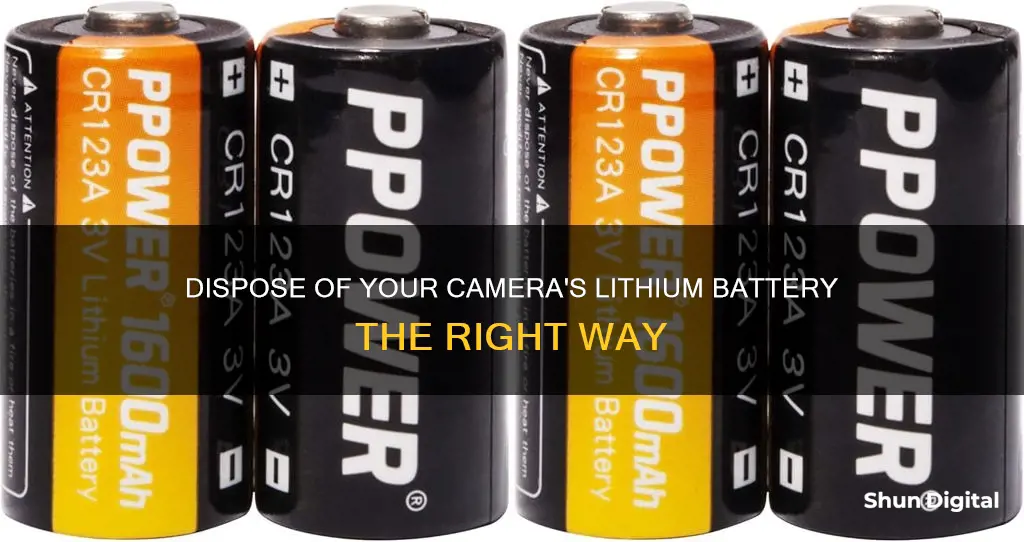
Improper disposal of lithium batteries can have serious environmental and safety consequences. Lithium is a highly reactive element that can cause fires or release harmful chemicals if not processed correctly. In this guide, we will outline the steps to safely dispose of lithium camera batteries, including how to prepare them for recycling, where to take them, and what to avoid.
| Characteristics | Values |
|---|---|
| What | Lithium-ion batteries |
| Why dispose of them properly | To avoid fire hazards, environmental pollution, poisoning, groundwater contamination, and health risks |
| Where to dispose of them | Local Call2Recycle locations, hazardous waste agencies, or professional lithium battery recycling centers |
| Preparation for disposal | Tape the terminals, place each battery in a separate plastic bag, or put them in a box to prevent acid leaks |
| Transportation | Keep batteries at a moderate temperature and away from flammable materials |
| Disposal process | Disassembly, material separation, and recovery and repurposing of materials such as cobalt, lithium, and nickel |
| Environmental compliance | Adhere to local regulations and promote safe disposal practices |
| Corporate responsibility | Check if the device manufacturer offers a recycling program for batteries |
What You'll Learn

Tape the terminals to avoid short circuits
When disposing of a lithium camera battery, it is important to take precautions to ensure safety and avoid any potential hazards. One crucial step is to tape the terminals of the battery to prevent short circuits. Short circuits can occur when the positive and negative terminals of the battery come into contact with each other or with other metal objects, potentially leading to a fire.
To effectively tape the terminals, start by inspecting the battery for any exposed wires or terminals. If your lithium camera battery has a protruding positive terminal, often marked with a "+" symbol, simply place a piece of tape over it. You can use clear packing tape, masking tape, or electrical tape to secure the terminal. Make sure the tape covers both the top and bottom of the battery, ensuring no part of the terminal is left exposed. This will prevent accidental contact between the terminals and any conductive materials.
If you have multiple batteries to dispose of, you can place them side by side, with their positive terminals facing the same direction. Then, use a longer piece of packing tape to cover the row of positive terminals. Afterward, place another length of tape over the negative terminals to secure them in place. This method ensures that the batteries stay together and reduces the risk of short circuits during transportation to a recycling center.
It is worth noting that some battery types, such as 6-volt batteries, may require additional steps. For these batteries, consider placing masking tape around the terminal springs to prevent smaller button-cell batteries from becoming wedged between the terminals. Additionally, if your lithium camera battery is damaged or leaking, take extra care to handle it with protective gloves and eyewear. Place the battery in a separate bag or approved container before disposal or recycling.
By taking the time to tape the terminals of your lithium camera battery, you can help ensure safe disposal and recycling while reducing the risk of short circuits and potential fires. Remember to always follow local guidelines and regulations for proper lithium battery disposal.
Lorex Cameras: Low-Battery Alerts and Notifications Explained
You may want to see also

Place in a separate container
When disposing of lithium camera batteries, it is important to place them in a separate container. This is because lithium batteries contain harmful metals that can be dangerous to the environment and toxic to humans and animals if not disposed of properly.
To prepare your lithium camera batteries for disposal, start by taping the battery terminals with clear packing, masking, or electrical tape. This will help prevent short circuits and fires during transport. Place each battery in its own plastic bag, such as a small plastic grocery bag or a Ziploc-type bag, to further isolate the terminals. You can also use the individual bags included with Call2Recycle collection boxes.
Once all the batteries are taped and bagged, place them in a separate container away from other batteries that do not require taping. This container can be a coffee can, bucket, or any other suitable container that can be closed tightly. If you are using a coffee can, it is recommended to fill it with kitty litter to suppress any potential fires.
Make sure to dispose of your lithium camera batteries responsibly by taking them to a local hazardous waste facility or a specialised battery recycler. Do not throw them into your regular trash or recycling bin, as this can pose a safety risk. Some retailers, such as Best Buy, The Home Depot, Lowe's, and Staples, also offer battery recycling drop-off locations.
Wireless Cameras: Battery-Powered Security?
You may want to see also

Drop off at a recycling centre
Dropping off your lithium camera battery at a recycling centre is a safe way to dispose of it.
First, you need to prepare your battery for recycling. Tape the terminals of the battery with clear packing, masking, or electrical tape. You can also place the battery in a bag to prevent short-circuiting, which could cause a fire. If you use a bag, make sure it is a small plastic bag without holes, such as a plastic grocery bag or a Ziploc bag.
Once your battery is prepared, you can drop it off at a recycling centre. Many retailers, such as Best Buy, The Home Depot, Lowe's, and Staples, have recycling drop-off locations. There are also dedicated battery recycling centres, such as GreenCitizen in the San Francisco Bay Area, which can be found using an online directory.
When transporting your battery to the recycling centre, ensure it is kept at a moderate temperature and away from any flammable materials.
It is important to note that lithium batteries cannot be disposed of with regular trash or recycling. They must be handled separately and recycled properly to prevent fires and environmental damage.
Charging the Fujifilm XP80: A Step-by-Step Guide
You may want to see also

Don't put in regular trash
Lithium batteries contain valuable materials such as cobalt, graphite, and lithium, which are considered critical minerals. These critical minerals are raw materials that are economically and strategically important to the United States. When lithium batteries are disposed of in the regular trash, we lose these critical resources outright.
Additionally, lithium batteries contain reactive chemicals and metals that can generate electrical energy. If they are thrown away in the regular trash, these toxic metals can hurt the environment and become dangerous to humans and animals.
Lithium-ion batteries, if not properly managed at the end of their useful life, can cause harm to human health or the environment. For example, if a lithium-ion battery or an electronic device containing the battery is disposed of in the regular trash or placed in the municipal recycling bin, it may become damaged or crushed in transport or from processing and sorting equipment, creating a fire hazard.
Due to the dangers associated with disposing of lithium batteries in the regular trash, it is recommended that they be taken to separate recycling or household hazardous waste collection points. Some municipalities' waste management programs offer community battery recycling through depots, safety/community fairs, roving trucks, or curbside pickup. There are also companies such as Call2Recycle that offer drop-off locations for recycling lithium batteries.
Avoid Congestion Charges: Know Your Camera Blindspots
You may want to see also

Check local laws
When disposing of lithium camera batteries, it is essential to be aware of the local laws and regulations in your area. These laws can vary from state to state and even between localities, so it is crucial to consult the relevant authorities or websites to ensure you are compliant. Here are some guidelines and considerations to keep in mind:
Understanding the Hazards of Lithium Batteries
Lithium batteries, commonly found in digital cameras, contain harmful metals that pose a risk to the environment and human and animal health if not disposed of properly. They can cause fires if their terminals come into contact with other batteries or conductive materials during transportation to recycling centres. Therefore, it is crucial to take precautions such as taping the battery terminals or placing them in separate bags to prevent short circuits.
Federal Regulations and Guidelines
While the U.S. Environmental Protection Agency (EPA) does not regulate the disposal of small quantities of lithium batteries, it is essential to note that large quantities are regulated under the Universal rules of Hazardous Waste regulations (40 CFR PART 273). Additionally, the shipment of lithium batteries is governed by the Department of Transportation (DOT) in their Code of Federal Regulations (49 CFR), paragraph 173.185(j). The DOT also has a "Check the Box" campaign to raise awareness about the hazards of lithium batteries during transportation.
State and Local Regulations
Individual states and localities have their own guidelines for lithium battery disposal. For example, in California, it is illegal to throw away any kind of battery, and you must take them to an authorized recycling centre or hazardous waste disposal facility. Other states, like Connecticut and Washington, have implemented recycling laws that mandate recycling for all residents and businesses. Some states also have specific requirements for disposing of certain types of batteries, such as lead-acid batteries. Therefore, it is essential to check the laws and regulations specific to your state and locality.
Recommended Disposal Methods
Many local districts host collection events or have drop-off locations for residents to dispose of lithium batteries properly. Some retailers, such as The Home Depot, also offer free recycling of rechargeable batteries. If no local options are available, some companies provide mail-in recycling kits for a fee. However, always ensure that you follow postal shipping precautions when mailing batteries.
Smart Strategies for Carrying Extra Camera Batteries
You may want to see also
Frequently asked questions
Tape the contacts with clear packing, masking, or electrical tape to prevent the contacts from accidentally coming together. You can also place the battery in a separate bag to prevent short-circuiting.
You can drop off your lithium camera battery at one of the 30,000 Call2Recycle locations in North America. Most sites are within 10 miles of a home or office and include retailers such as Best Buy, The Home Depot, Lowe's, and Staples.
No, you should never throw lithium batteries in the trash. Lithium batteries contain harmful metals that can be dangerous to the environment and toxic to humans and animals.
Improper disposal of lithium batteries can lead to environmental pollution and increase the risk of fire or poisoning. Lithium batteries can also cause underground fires in landfills, releasing toxic chemicals and creating substantial voids that can lead to surface collapse.
Always follow local regulations and guidelines for battery disposal. Keep the batteries in a cool, dry place and away from flammable materials during transport. If the batteries are damaged, store them in an insulated plastic bag to prevent short-circuiting.







